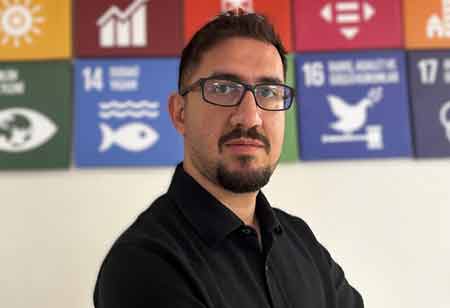Sercan Köçer has over twelve years of precious experience with a comprehensive background in environmental engineering focusing on Energy, mining and chemicals, involvement in extensive field applications and deep expertise in sustainability practices. His career, rooted in environmental engineering, has provided him with significant experience both in fieldwork and in management roles, developed a thorough understanding of corporate sustainability, closely monitoring environmental and sustainability regulations and implementing strategies to ensure compliance.
Observing Shifts and Transformations Over Time
I was fortunate, as an environmental engineer, to begin my career at a company deeply focused on sustaniability topics based on environment, which were still in their infancy at that time. My second role was with the country’s largest energy company, where I started as an environmental engineer and was later promoted to a executive position, with responsibilities expanding to include sustainability. Currently, I serve as the Sustainability Manager at AKSA.
I often liken sustainability to a dynamic, ever-curious youth, always seeking change and innovation, never truly reaching maturity. Initially, sustainability was heavily focused on environmental issues, with a primary interest in climate, water and waste management. However, in recent years, social issues have also become part of the sustainability approach, with a notable shift toward viewing social and environmental topics in an integrated way. I think this is an excellent development, as all environmental impacts inherently have a social dimension as well.
AKSA Defining the Importance of Sustainability
At AKSA, we prioritize our environmental impact and responsibilities toward nature throughout all our business processes. In line with the Brundtland Report's definition, we design our processes and carry out our production to meet today's needs while keeping future generations' needs in mind.
It will be advantageous to thoroughly understand environment, shape future plans accordingly and set goals that align with positive approaches
We serve a wide range of sectors, including textiles, technical textiles, automotive and cement, each of which has significant sustainability sensitivities—particularly concerning climate and water issues. These high expectations, coupled with the responsibility of being the largest entity in our field globally, drive us to set an example and strengthen our commitment to environmental practices and sustainability.
Planning Environmental and Sustainability Processes for the Future
At AKSA, we recognize that environmental and other sustainability-focused issues are interconnected and continuous. Therefore, rather than a narrow, isolated focus on individual topics, we consider each process holistically—examining not only the issues themselves but also their causes and resulting impacts.
Both current and future environmental risks and potential effects shape our business practices and decision-making dynamics. Consequently, when setting forward-looking goals, our first priority is to thoroughly analyze both our impact on the environment and the ways in which changing environmental conditions impact us.
Integrating Sustainability in Product Development
In previous years, when developing a new product, the primary considerations were typically fundamental criteria such as cost, market demand and alignment with customer expectations.
However, over time, the environmental impact of the products we manufacture or the processes we design has gained importance. Today, the first question we ask when developing a product is often how “green” it will be.
In response, we restructured our organization last year, integrating our sustainability unit to work in close coordination with our R&D team. Reflecting the importance we place on this area, our Sustainability Department is now positioned under our newly formed R&D and Sustainability division at AKSA. This setup enables our teams to evaluate the environmental and other sustainability impacts at the very first stages of product development, ensuring an aligned, collaborative approach from the outset.
The Future of Sustainable Practices
Beyond doubt, issues related to climate and water are now essential areas of focus. It is crucial for organizations that have not yet taken action on these fronts to do so swiftly. Looking ahead, approaches involving biodegradable materials will play a prominent role as well. For organizations in any sector, it will be advantageous to thoroughly understand environment, shape future plans accordingly and set goals that align with these positive approaches.


